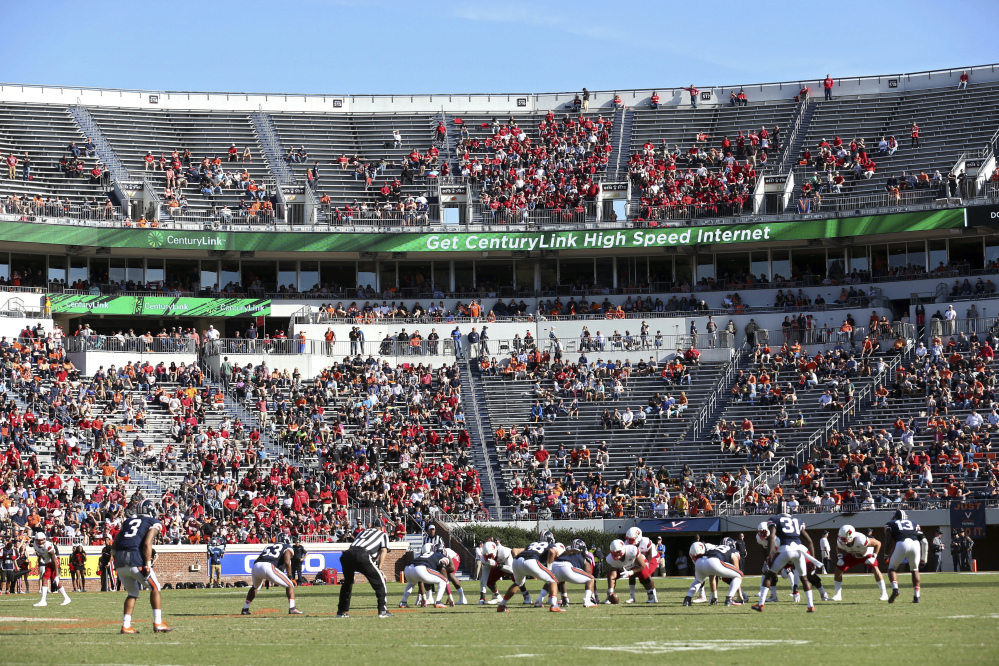In case you needed a reminder, you can have too much of a good thing.
Sensitivity is a good thing. Having respect for people’s feelings is a good thing. Progressive thinking counts, too.
What isn’t a good thing?
Treating people like they’re fragile enough that the slightest tap can cause them to splinter into pieces. Or insulting people’s intelligence and pandering to the hot-button topics of the day.
ESPN tried to make a move into that first group. Instead, it careened headlong into the second.
The Worldwide Leader in Sports saw a nationwide controversy and tried to sidestep it.
On Aug. 12, far-right and white supremacist protesters clashed violently with counter protesters in Charlottesville, Virginia during a rally that was started to oppose the removal of a statue of Robert E. Lee, stirring a debate that has raged since about the sensibility of honoring figures of the Confederacy. The violent clash resulted in one death and 19 injuries, when a car driven by James Alex Fields plowed into a crowd of people.
Meanwhile, a broadcaster named Robert Lee was slated to call a Sept. 2 college football game involving the University of Virginia, which is in Charlottesville.
It’s a coincidence, and a humorous one at that. ESPN didn’t see it that way. The company took Lee off the broadcast and put him on a Youngstown State-Pittsburgh game instead, and when the switch became public, the network defended its choice by admitting that the move was done just for his name.
His name.
One belonging to a reporter who, in adding to the ridiculous nature of the move, is Asian-American.
“We collectively made the decision with Robert to switch games as the tragic events in Charlottesville were unfolding, simply because of the coincidence of his name,” ESPN wrote in a statement. “In that moment it felt right to all parties.”
It felt right? It felt right to remove someone who couldn’t look less like a Civil War general if he tried off a broadcast because he had a name in common? Robert Lee hasn’t been posting about his Confederate backings or jumping into the fray about Donald Trump’s stance on the KKK. Lee’s been tweeting about horse racing and likely preparing to call a college football game. He’s going to be the one igniting another blowup?
On its face, this isn’t an outrage. ESPN isn’t being a bully. It didn’t ban Lee from the assignment, and all evidence suggests that it didn’t strong-arm him into agreeing to an assignment change. It’s silly, over-the-top and unnecessary. It’s all those words to think people would be offended to see Lee’s name on the broadcast. It’s all those words to think people would draw up a link between two people born more than 150 years apart, and it’s all those words to think that prompting a flurry of mocking headlines, a concern of ESPN’s, according to the Los Angeles Times, was a serious obstacle to avoid.
Where it becomes less silly and more serious is in the role ESPN’s decision could play in the national discussion the network tried so hard to avoid. The discussion revolving around Confederate icons — the statues, the flag, the use of mascots like “Rebels” for sports teams — has become a heated one, and those arguing for diminishing, if not removing, the Confederacy’s imprint on the country are met by an opposition that values its place in history. The arguments often resort to whataboutism and hyperbole, with the thought being that if Robert E. Lee goes, what’s next? Does Thomas Jefferson go? George Washington? Who else?
The counter is an appeal to rationality, that a simple, sensible change doesn’t mean slipping into overreaction. This is where ESPN’s decision hurts the cause. ESPN’s call is an example of what the supporters of Confederate landmarks are saying. It fuels their point. We were right, they can say. You took Robert E. Lee, they can argue, and now anyone named Robert Lee has to be affected by this. Look how over-the-line they’re being, they can say. The progressive minds in this discussion have tried to base their case in reason, and ESPN showed what it looks like when its case lacks it.
ESPN wasn’t looking to join the fight, but it provided one of its sides with some evidence. And in an ongoing argument with volatile tempers and high emotions, that’s where the silliness fades away.
Drew Bonifant — 621-5638
dbonifant@centralmaine.com
Twitter: @dbonifantMTM
Send questions/comments to the editors.




Success. Please wait for the page to reload. If the page does not reload within 5 seconds, please refresh the page.
Enter your email and password to access comments.
Hi, to comment on stories you must . This profile is in addition to your subscription and website login.
Already have a commenting profile? .
Invalid username/password.
Please check your email to confirm and complete your registration.
Only subscribers are eligible to post comments. Please subscribe or login first for digital access. Here’s why.
Use the form below to reset your password. When you've submitted your account email, we will send an email with a reset code.